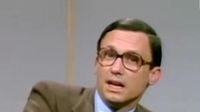Fifteen years have passed since the death of the iconic journalist Maurizio Mosca, a figure who left an indelible mark on Italian sports journalism. His legacy, characterized by a unique blend of humor and insight, continues to resonate with fans and colleagues alike.
Maurizio Mosca passed away on April 3, 2010, at the age of 69, after a prolonged illness at the San Matteo hospital in Pavia. Known for his vibrant personality and sharp wit, Mosca transitioned seamlessly from print to television, captivating audiences with his engaging style.
The son of Giovanni Mosca, who also worked as a journalist, and the brother of writer Paolo, Maurizio was immersed in the world of journalism from a young age. His career began in 1979 with private television stations in Lombardy, where he quickly made a name for himself. He was particularly famous for his work on "Guida al Campionato," especially during the 1990s, which showcased his deep understanding of football and its intricacies.
Throughout his career, Mosca demonstrated an uncanny ability to connect with the audience. He became a familiar face on various sports programs, including "Supergol" and "Calciomania," where he worked alongside Cesare Cadeo in the late 1980s. His presence was a staple on Mediaset's sports broadcasts, especially during the Tuesday appeals and segments dedicated to football.
One of the most memorable moments in Mosca's career occurred in 1983 when he was the editor-in-chief of "Gazzetta." After traveling to Udine to interview the legendary Brazilian footballer Zico, Mosca published a statement attributed to him regarding Michel Platini. However, Zico later denied ever granting such an interview during an appearance on Biscardi's "Processo del Lunedì." This incident led to Mosca's suspension and eventual dismissal from "Gazzetta," marking a turning point in his career.
Despite the setback, Mosca's ability to reinvent himself shone through. He leveraged his notoriety to become a beloved figure on television, entertaining viewers with his distinctive style and humor. He had a knack for making the football transfer market feel exciting and engaging, long before the term "viral" became commonplace.
His signature segment, known as "Zitti e Mosca," became a cultural phenomenon, drawing millions of viewers and solidifying his status as a household name in Italy. Mosca's ability to blend facts with entertainment made him a pioneer in sports journalism, often blurring the lines between serious reporting and light-hearted commentary.
Even after his passing, Mosca's influence remains palpable in the world of sports journalism. Many of his colleagues and fans continue to share stories and reminisce about the moments that defined his career. His legacy is commemorated through a series of iconic images that capture his vibrant personality and dedication to the craft.
As the anniversary of his death approaches, the sports community reflects on the impact Mosca had on the industry and the generations of journalists who followed in his footsteps. His unique approach to storytelling and his ability to connect with audiences set a standard that many aspire to achieve.
In remembering Maurizio Mosca, it is essential to celebrate not only his contributions to sports journalism but also the joy and laughter he brought to millions. His passion for football and his charismatic presence on screen made him a beloved figure, and his legacy will undoubtedly endure for years to come.
As we look back on his life and career, it is clear that Maurizio Mosca was more than just a journalist; he was a pioneer who transformed the landscape of sports media in Italy. His journey from print to television, marked by both triumphs and challenges, serves as an inspiration to aspiring journalists everywhere.
In a world where the media landscape is constantly evolving, Mosca's ability to adapt and innovate remains a guiding light. His story reminds us that the essence of journalism lies in the ability to connect, inform, and entertain—qualities that Mosca embodied throughout his illustrious career.
As we honor his memory, let us carry forward the lessons he imparted and strive to uphold the values he championed in the world of journalism.





